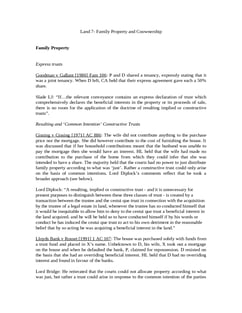Ashburn Anstalt v Arnold [1989] Ch 1 at 13C-22D
Judgement for the case Ashburn Anstalt v Arnold
KEY POINTS
Rent payment is not a necessary requirement for a tenancy agreement. The tenants held the land with a better interest.
A constructive trust arises when the property owner's behaviour leads to an inequitable situation where denying the claimant's interest in the property would be unjust.
The mere inclusion of a "subject to" clause in a contract does not automatically invoke a constructive trust. Such a clause may merely indicate the buyer's notice of existing interests, rather than a request for the seller to respect those interests.
FACTS
Arnold & Co. leased business premises at 126 Gloucester Road, London, and sold the lease to Matlodge Ltd. Arnold & Co. retained the right to remain as licensees at no charge until redevelopment on a quarter's notice.
Matlodge promised a future lease upon redevelopment. Cavendish Land Co. Ltd acquired the freehold and lease, assuming contractual obligations. Legal & General Assurance Society Ltd acquired Cavendish and took over the contract.
The freehold was eventually sold to Ashburn Anstalt, who acquired it "subject to" the Arnold & Co. contract. Ashburn had no redevelopment plans but sought possession regardless.
JUDGEMENT
The court ruled in favour of Arnold.
COMMENTARY
The court's analysis of the "subject to" clause underscores the importance of discerning between a mere notice and an intention to respect existing interests.
This case highlights the court's commitment to ensuring fairness and equitable remedies in property disputes, requiring a clear connection between the owner's conduct and the conscience of the property's status.
ORIGINAL ANALYSIS
Various leases of properties had been granted.
Defendant occupied the property under an arrangement under which they paid no rent.
The landlord sought possession, saying that the agreements were licences not tenancies because of the absence of rent and that licenses were not interests in property.
Held
The payment of rent is not an essential qualification for a tenancy agreement. Here, there was a tenancy due to the exclusive possession granted, which meant an overriding interest applied.
CA also held that contractual licences were rights in personam and not in rem.
Fox LJ
The case of Errington ought to have reached the same conclusion but by a different route to that proposed by Denning LJ (that contractual licenses are rights in rem) since that was plainly wrong and an extension, not a true interpretation, of the Winter Gardens case, which did not include third parties.
-
The conclusion could have been reached by:
Estoppel through misrepresentation
An equitable interest was conferred in the form of an estate contract, or
By constructive trusts.
On using constructive trusts: “The test, for the present purposes, is whether the owner of the property has so conducted himself that it would be inequitable to allow him to deny the claimant an interest in the property”.
This does not automatically arise where a contract sells something “subject to” another interest, as this may simply be a way of giving notice the buyer of other interests currently existing and NOT requesting that the seller respect such interests.
-
Constructive trust is invoked if “the owner of the property has so conducted himself that it would be inequitable to allow him to deny the claimant an interest in the property”.
This does nothing for legal certainty. He should have just said either way that CT would or wouldn’t be imposed on a purchaser with notice regardless of his moral status.
The court will not impose a constructive trust unless it is satisfied that the conscience of the estate owner is affected.” Constructive trust is invoked if “the owner of the property has so conducted himself that it would be inequitable to allow him to deny the claimant an interest in the property
ADDITIONAL INFORMATION
For Further Study on Ashburn Anstalt v Arnold
Need instant answers? Our AI exam tutor is here to help.
Ask questions 🙋 Get answers 📔 It's simple 👁️👄👁️
Our AI is educated by the highest scoring students across all subjects and schools. Join hundreds of your peers today.
Get StartedSimilar Cases
Related Product Samples
These product samples contain the same concepts we cover in this case.
| Land Law | Leases Notes (77 pages) |

 Since 2010, Oxbridge Notes has been a trusted education marketplace, supplying high-quality materials from top achievers at universities like Oxford, Cambridge, LSE, Harvard, and Yale.
Since 2010, Oxbridge Notes has been a trusted education marketplace, supplying high-quality materials from top achievers at universities like Oxford, Cambridge, LSE, Harvard, and Yale.